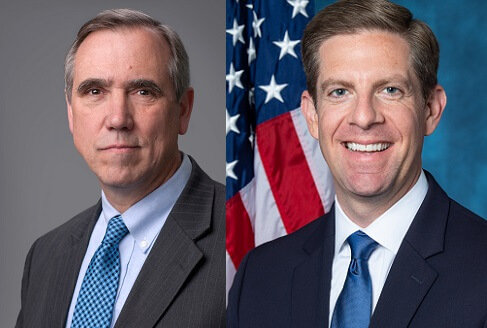U.S. Sen. Jeff Merkley, D-Ore., and Rep. Mike Levin, D-Calif., have introduced the Zero-Emission Vehicles Act of 2019, which proposes an aggressive plan for transitioning the U.S. to battery electric and hydrogen fuel cell vehicles.
Introduced in both the U.S. Senate and House of Representatives, the bill would set a Federal Zero-Emissions Vehicle standard, requiring that by 2030, 50% of sales for new passenger vehicles are zero-emission. The standard would ramp up 5% each year, reaching 100% by 2040.
“The future of our planet is at stake, and so is the future of our economy,” says Merkley. “If we lead the world in cutting-edge vehicle deployment, we can beat our global competitors, create good jobs here in America and win the innovation race for new technologies. This legislation embraces the opportunity for America to sell to the world the revolutionary technology that will make our air cleaner, communities healthier and workforce stronger.”
“The climate crisis is a defining issue of our time, and we must pursue bold measures commensurate with the enormous challenge we face,” adds Levin. “We can combat climate change aggressively, improve public health and lead the world in manufacturing innovative technology by embracing zero-emissions vehicles at the same time. I am proud to lead ambitious legislation that will accomplish all of those critical goals.”
According to the lawmakers, 10 states currently require that a certain percentage of new vehicles sold within the state be zero-emission. Although state commitments play a vital role in the transition to ZEVs, Merkley and Levin say a federal policy is needed.
Endorsing the bill is Plug In America, a nonprofit promoting the use of electric vehicles.
“This is a huge step in the right direction for America’s transportation policy,” says Joel Levin, executive director of Plug In America. “The 10 states that have already adopted a ZEV mandate are leading the way in electric vehicle adoption. A national ZEV mandate would send a huge signal to automakers and consumers that the future of transportation is electric and would significantly accelerate the adoption of EVs across the country.
“The growth of the EV sector promotes jobs in the U.S. in the fields of technology and innovation and keeps us competitive with countries like China,” continues Levin. “Not only this, but EVs provide cleaner air, reduce our reliance on foreign oil and reduce carbon emissions. EVs are a win-win for everyone.”






Electric Vehicles are far from “Environmentally Friendly” Batteries are dirty to produce and dispose of. Mining cobalt and lithium is dirty. Large percentage of electricity is produced by coal burning power plants–also dirty. Renewable Natural Gas is a carbon-negative, zero emission fuel produced from animal waste, human sewage, and landfills that would otherwise release Greenhouse Gas methane to the atmosphere. Sure, electricity is clean when used as a fuel—but you have to see where it came from and what it takes with batteries to use it for transportation. Those things are FAR from clean and environmentally friendly. Learn about Renewable… Read more »